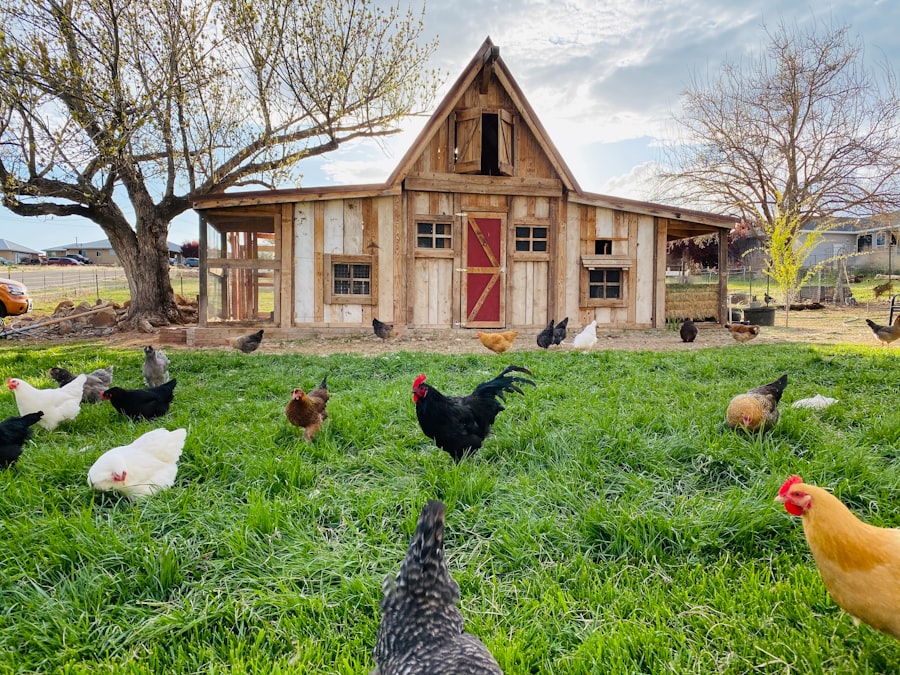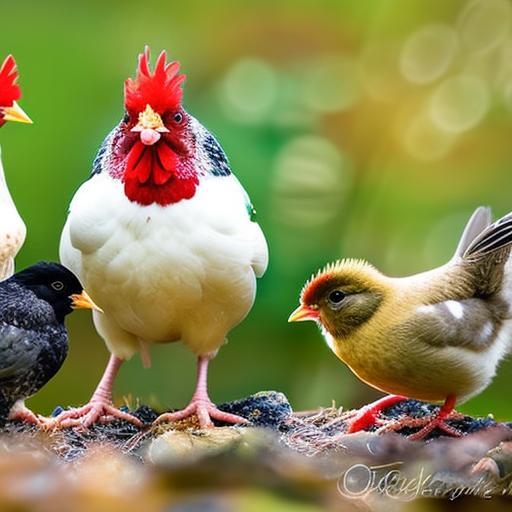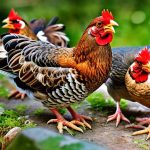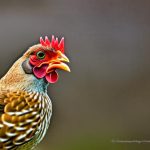Keeping chickens in winter can be a challenging task, as the cold temperatures and harsh weather conditions can pose risks to their health and well-being. However, with proper preparation and care, you can ensure that your chickens stay warm, healthy, and happy throughout the colder months. One of the most important aspects of winter chicken care is preparing the chicken coop for the winter season. This involves cleaning out the coop, checking for any damage or holes that need to be repaired, and adding extra bedding to keep the chickens warm.
Key Takeaways
- Proper preparation of the chicken coop is essential for winter survival
- Insulation and ventilation are key factors in keeping chickens warm and healthy
- Keeping the coop clean and dry is crucial for preventing health issues
- Providing fresh water and protecting against predators are important winter tasks
- Being aware of common winter health issues and taking preventative measures can save your chickens’ lives
Preparing the Chicken Coop for Winter
Before the winter season arrives, it is crucial to clean out the chicken coop thoroughly. Remove all old bedding, droppings, and any other debris that may have accumulated over time. Cleaning the coop not only helps to maintain a hygienic environment for your chickens but also prevents the buildup of harmful bacteria and parasites.
While cleaning the coop, it is also essential to check for any damage or holes that need to be repaired. Inspect the walls, windows, doors, and roof for any cracks or gaps that may let in cold air or allow predators to enter. Seal any openings with caulk or weatherstripping to ensure that the coop remains warm and secure.
Adding extra bedding to the coop is another crucial step in preparing it for winter. Bedding acts as insulation and helps to keep the chickens warm by trapping their body heat. Straw or wood shavings are excellent choices for bedding material as they provide good insulation and absorb moisture effectively.
Insulating the Chicken Coop
Insulating the chicken coop is essential for maintaining a warm and comfortable environment for your chickens during winter. There are several types of insulation that can be used, including foam board insulation, fiberglass insulation, and reflective insulation.
Foam board insulation is a popular choice as it is easy to install and provides excellent insulation properties. It can be cut to fit the walls and ceiling of the coop and then secured in place with adhesive or screws. Fiberglass insulation is another option, but it requires more careful handling as the fibers can be irritating to the skin and lungs. Reflective insulation, such as radiant barrier foil, can also be used to reflect heat back into the coop.
When insulating the coop, it is important to ensure that there is proper ventilation. While insulation helps to keep the coop warm, it can also trap moisture and ammonia from chicken droppings if there is inadequate airflow. To provide proper ventilation, install vents or windows that can be opened and closed as needed. This allows fresh air to circulate while preventing drafts.
Providing Proper Ventilation
Proper ventilation is crucial in the winter to maintain good air quality and prevent the buildup of moisture and ammonia in the coop. While it may seem counterintuitive to let cold air into the coop, it is essential for the health and well-being of your chickens.
Ventilation helps to remove excess moisture from the coop, which can lead to respiratory issues and frostbite in chickens. It also helps to reduce ammonia levels, which can cause eye and respiratory irritation. However, it is important to strike a balance between providing adequate ventilation and preventing drafts.
To provide proper ventilation without letting in too much cold air, install vents or windows that can be opened and closed as needed. This allows you to control the airflow and adjust it according to the weather conditions. It is also important to ensure that the vents are positioned high up on the walls or roof of the coop to prevent drafts.
Keeping the Coop Clean and Dry
Keeping the coop clean and dry is essential for the health and well-being of your chickens during winter. Moisture in the coop can lead to frostbite, respiratory issues, and other health problems. Therefore, it is important to regularly clean out the coop and remove any moisture that may have accumulated.
To clean the coop, remove all old bedding, droppings, and any other debris. Use a shovel or rake to scrape off any stuck-on droppings or dirt. Once the coop is clean, allow it to air out and dry completely before adding fresh bedding.
In addition to regular cleaning, it is also important to prevent moisture from accumulating in the coop. This can be done by ensuring that the coop is well-ventilated and by using absorbent bedding material. Bedding such as straw or wood shavings helps to absorb moisture and keep the coop dry.
Feeding Your Chickens in Winter

Feeding your chickens a balanced diet is important year-round, but it becomes even more crucial in the winter when their nutritional needs may change. During the colder months, chickens require more energy to stay warm, so it is important to provide them with a diet that is high in calories and nutrients.
One way to provide extra calories to your chickens in winter is by offering them scratch grains. Scratch grains are a mixture of cracked corn, wheat, barley, and other grains that provide a good source of energy. You can scatter scratch grains on the ground or in a shallow dish for your chickens to peck at throughout the day.
In addition to scratch grains, it is important to continue feeding your chickens a balanced diet that includes a good quality layer feed. Layer feed contains essential nutrients such as protein, vitamins, and minerals that are necessary for egg production and overall health.
Providing Fresh Water in Winter
Providing fresh water to your chickens in winter can be challenging as it tends to freeze quickly in cold temperatures. However, it is crucial to ensure that your chickens have access to clean and unfrozen water at all times.
One way to prevent water from freezing is by using heated waterers or heated bases for your existing waterers. These devices are designed to keep the water above freezing temperatures, ensuring that your chickens have access to fresh water throughout the day.
If you do not have access to heated waterers, you can also try using insulated waterers or placing a small floating object, such as a ping pong ball, in the water. The movement of the object helps to prevent the water from freezing completely.
Protecting Your Chickens from Predators in Winter
Predators pose an increased risk to chickens in the winter as they may be more desperate for food due to limited resources. It is important to take extra precautions to protect your chickens from predators during this time.
One of the most effective ways to protect your chickens from predators is by ensuring that the coop and run are secure. Repair any damage or holes in the coop and reinforce it with hardware cloth or wire mesh to prevent predators from entering. Also, make sure that the coop has a secure latch on the door to prevent predators from opening it.
In addition to securing the coop, it is important to provide a safe and predator-proof run for your chickens. Use hardware cloth or wire mesh to enclose the run and bury it at least 12 inches deep to prevent predators from digging under.
Dealing with Common Winter Health Issues in Chickens
Chickens may face several health issues during winter, including respiratory issues, frostbite, and vitamin deficiencies. It is important to be aware of these issues and take steps to prevent and treat them.
Respiratory issues can occur when chickens are exposed to drafts or poor ventilation in the coop. To prevent respiratory issues, ensure that the coop is well-ventilated and free from drafts. If you notice any signs of respiratory distress in your chickens, such as coughing or wheezing, consult a veterinarian for proper diagnosis and treatment.
Frostbite can occur when chickens are exposed to extreme cold temperatures for prolonged periods. To prevent frostbite, ensure that the coop is well-insulated and provide extra bedding for your chickens to keep warm. If you notice any signs of frostbite, such as blackened or swollen combs and wattles, consult a veterinarian for proper treatment.
Vitamin deficiencies can occur in winter when chickens have limited access to fresh greens and insects. To prevent vitamin deficiencies, provide your chickens with a balanced diet that includes a good quality layer feed. You can also offer them leafy greens, such as kale or spinach, as a treat to supplement their diet.
Conclusion and Final Tips for Keeping Chickens in Winter
In conclusion, keeping chickens in winter requires proper preparation and care to ensure that they stay warm, healthy, and happy. By cleaning out the coop thoroughly, insulating it properly, providing proper ventilation, keeping the coop clean and dry, feeding your chickens a balanced diet, providing fresh water, protecting them from predators, and addressing common winter health issues, you can ensure that your chickens thrive throughout the colder months.
Here are some final tips for keeping chickens in winter:
– Monitor the temperature inside the coop regularly to ensure that it remains within a safe range for your chickens.
– Provide extra roosting space for your chickens to keep warm.
– Use heat lamps sparingly and with caution as they can be a fire hazard.
– Check on your chickens regularly to ensure that they are healthy and comfortable.
– Consider adding windows or clear roofing panels to the coop to allow natural light in during the shorter winter days.
By following these tips and providing proper care and attention, you can enjoy the company of your chickens year-round and ensure that they stay happy and healthy even in the coldest months of winter.
If you’re interested in learning more about keeping chickens in winter, you might also find this article on “What Kind of Coop is Best for Chickens?” from Poultry Wizard helpful. It provides valuable insights into choosing the right coop for your chickens to ensure their comfort and well-being during the colder months. Check it out here.
FAQs
What are the best chicken breeds for winter?
Some of the best chicken breeds for winter include Rhode Island Reds, Plymouth Rocks, and Wyandottes. These breeds have thick feathers and can withstand cold temperatures.
How do I keep my chicken coop warm in winter?
You can keep your chicken coop warm in winter by insulating the walls and roof, using a heat lamp or heater, and providing plenty of bedding for your chickens to snuggle in.
What should I feed my chickens in winter?
In winter, you should feed your chickens a diet that is high in protein and fat to help them stay warm. This can include things like cracked corn, sunflower seeds, and mealworms.
How often should I clean my chicken coop in winter?
You should clean your chicken coop at least once a week in winter to prevent the buildup of moisture and bacteria. This will help keep your chickens healthy and comfortable.
How do I prevent my chickens’ water from freezing in winter?
You can prevent your chickens’ water from freezing in winter by using a heated waterer or by changing the water frequently throughout the day. You can also add a small amount of apple cider vinegar to the water to help prevent freezing.
Meet Walter, the feathered-friend fanatic of Florida! Nestled in the sunshine state, Walter struts through life with his feathered companions, clucking his way to happiness. With a coop that’s fancier than a five-star hotel, he’s the Don Juan of the chicken world. When he’s not teaching his hens to do the cha-cha, you’ll find him in a heated debate with his prized rooster, Sir Clucks-a-Lot. Walter’s poultry passion is no yolk; he’s the sunny-side-up guy you never knew you needed in your flock of friends!







